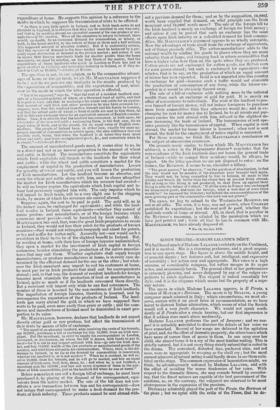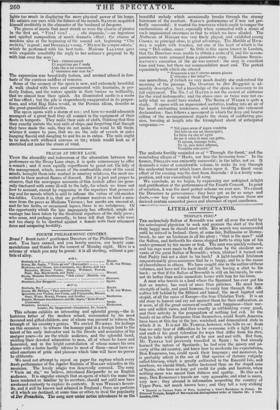have more of sorrow than of music in them. In
one song over her nose, were as appropriate to weeping as the shrill cry ; but the most earnest admirers of natural lights too nnich in displaying the mere physical power of his lungs. He satiates our ears with the fulness of his sounds. SANTINI acquitted hhnself creditably in the character of the husband of Imogene. 'The pieces of mnsic that most struck us were the chorus of pirates in the first act, "Viva! viva! . . . chi risponde,"—an ingenious lind spirited composition of much dramatic effect ; the chorus of maidens also at the beginning of the second act, beginning " Che rechi tu," is good ; and DONZEL LI'S song, "Ma non fia sempre odiata," which he performed with his best taste. Madame LALANDE gave with exquisite sensibility the reply to her seducer's proposal to fly with him over the seas :
" Taci : rimorsi amari Ci seguirian per P onda Lido che a lor ci asconda L' immenso mar non ha."
The expression was beautifully forlorn, and seemed uttered in fore- taste of the cureless sadriess of remorse.
Some of the scenery of the opera is new, and extremely beautiful. A walk shaded with trees and ornamented with fountains, is per- fectly Italian, and the waters sparkle in their basins so brilliantly, that we almost hear their splash. An illuminated castle is a scene of fine effect ; but the pile is stupendously exaggerated in its propor- tions, and what Haji Baba would, in the Persian idiom, describe as the great-grandfather of castles. The opera opens with a storm at sea ; and here we would admonish managers of a great fault they all commit in the equipment of their i fleets n tempests. They make their sails of cloth, thinking that thus they exactly imitate the real sails of ships, and forgetting that though they have made the sails, they do not make the wind to fill them; whence it comes to pass, that we see the sails of vessels in gales hanging flaccid and dangling to and fro as in calms. The sails ought to be mad with stiffened canvass or tin; which would look as if stretched out under the strain of wind.



















 Previous page
Previous page